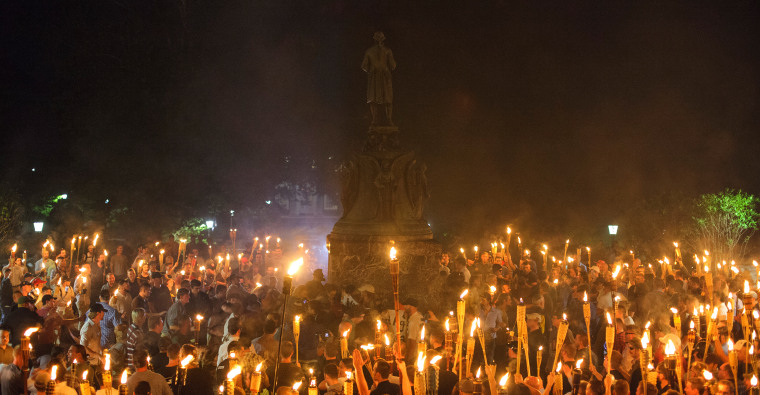A federal jury decided Tuesday that the organizers of the August 2017 “Unite the Right” rally in Charlottesville, Virginia, owe $25 million to nine people who were injured and maimed by the rally’s participants. What happened in Charlottesville — white men marching with tiki torches, chanting racist and antisemitic messages and fatally running over one of the counterprotesters who had the courage to stand up to them — was a wakeup call for many Americans who said they didn’t know our racial climate was that toxic and violent.
What happened in Charlottesville was a wakeup call for many Americans.
They should have known, though, because two years earlier, in Charleston, South Carolina, a 21-year-old white man, whose love of the Confederacy and its memorabilia would have made him feel at home among Charlottesville’s tiki-torch chanters, killed nine Black members of Mother Emanuel AME Church who had just welcomed him into their prayer circle.
Dylan Roof fatally shot the Rev. Clementa C. Pinckney, a state senator who served as pastor, as well as Cynthia Marie Graham Hurd, Susie Jackson, Ethel Lee Lance, DePayne Middleton-Doctor, Tywanza Sanders, Daniel Lee Simmons, Sharonda Coleman-Singleton and Myra Thompson.
Nikki Haley, then the governor of South Carolina, responded by having the Confederate battle flag removed from the top of the State House in Columbia. Days later, New Orleans Mayor Mitch Landrieu announced that his office had been discussing a plan to take down a prominent monument of Robert E. Lee, who had no connections to the Crescent City.
Other cities began to follow South Carolina’s and New Orleans’ example. Since then, monuments to unrepentant racists — including Ku Klux Klan founder Nathan Bedford Forrest — have come down in Baltimore; in Memphis, Tennessee; in St. Louis; in Indianapolis. Congress voted last year to remove statues from the U.S. Capitol, and on New Year’s Day Congress overrode then-President Donald Trump’s veto of a bill that included the renaming of military bases that honored Confederates.
Those who gathered in Charlottesville on Aug. 11 and 12, 2017, were there to defend a Robert E. Lee monument in his beloved Virginia. But that monument was carted off in July.
The monument’s removal and the $25 million bill the jury sent the "Unite the Right" organizers Tuesday may give the appearance that the battle ended in quite the Pyrrhic loss for the racists.
But the war goes on. Thus celebrating feels inappropriate.
According to one of the Emanuel church members whom Roof left alive, the self-described white supremacist said: "I have to do it. You rape our women and you're taking over our country. And you have to go."
The war goes on. Thus celebrating feels inappropriate.
According to a journal Roof kept between his arrest and his conviction for killing the nine Black churchgoers, his intention was to start a race war. As reported by The New York Times, in one entry, Roof wrote, “I did what I thought would make the biggest wave, and now the fate of our race is in the hands of my brothers who continue to live freely.”
Given what happened in Charlottesville; given what happened at the U.S. Capitol on Jan. 6; given what happened in Kenosha, Wisconsin; given what’s happening at school board meetings where lessons that acknowledge Black people’s oppression have essentially been outlawed; given how Republican-controlled legislative bodies are drawing legislative lines to wipe out Black people’s political strength and — on top of that — impeding Black people’s access to the ballot box, who’s to say that Roof didn’t succeed?
If on Aug. 10 you had told Jason Kessler, the lead organizer of the “Unite the Right” rally, and Richard Spencer, the white nationalist who coined the term "alt-right," that Lee would soon be gone but Black voting strength would soon be diluted or if you had told them that a jury would validate a gun-toting white kid’s decision to travel to a protest against police brutality and kill a couple of white people, it’s hard to imagine that they would not gladly accept that exchange.
Even now I’m not sure that they see the $25 million judgment as anything other than money well spent.

